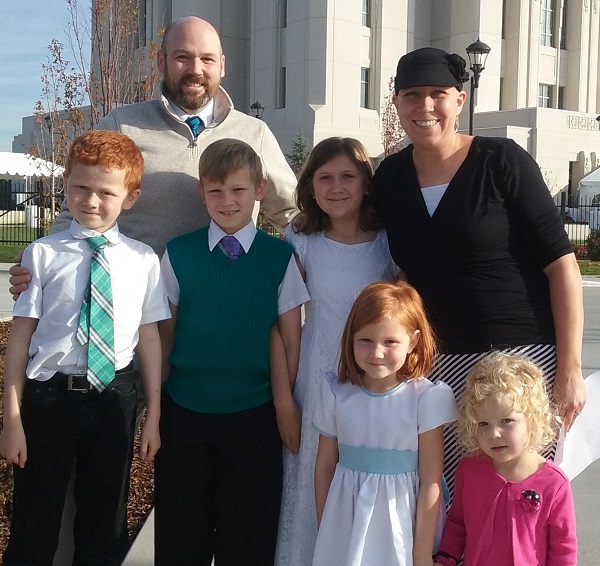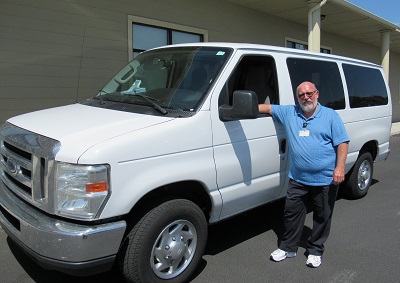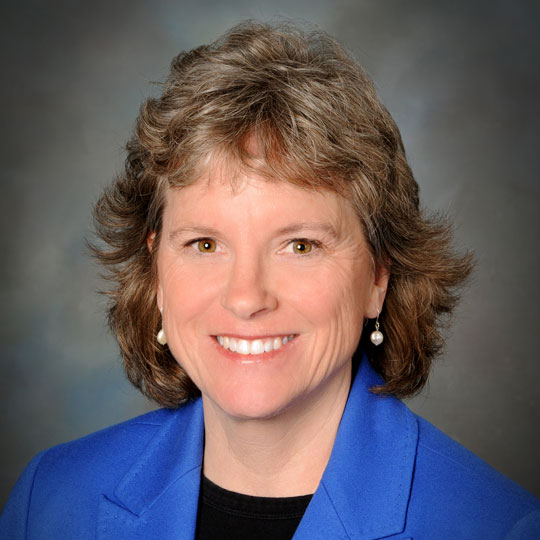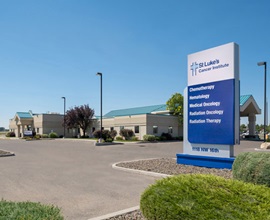Baker City Van Transports Rural Patients for Cancer Treatment

A busy mother of five children under the age of 11, Trina Butler of Union, Ore., is always on the go. “They keep me running,” she said.
But Butler was forced to slow down when she received a diagnosis of Stage 3 breast cancer in July 2017.
After undergoing a mastectomy and completing chemo, Butler faced a difficult choice about where to receive her 5-day-a-week radiation treatments. The Butlers’ home in rural Eastern Oregon is a 2-hour trip one way to the St. Luke’s Mountain States Tumor Institute clinic in Fruitland.
“The option was to move to where I was getting radiation for six weeks. I knew I couldn’t drive,” said Butler.
Thankfully, Butler was able to sign up for a free round-trip van ride from Baker City to Fruitland. The van is funded by individuals and the Baker City-based Leo Adler Foundation, which has contributed $57,000 total in the last four years.
“The van made it possible for me to be home before my kids get home from school,” she said. “My husband didn’t have to drive me back and forth and could take care of the two littlest kids.”
Butler’s day started early. She would leave her home at 6:30 a.m. in order to catch the van by 7:30 a.m. at the Eastern Oregon Medical Associates (EOMA) clinic in Baker City.
The van is driven by John Shepherd, who has a knack for making his passengers feel comfortable. A retired police officer, Shepherd has lived in Baker City since 1981. His wife, Stephanie Shepherd, is a medical assistant, and daughter Yonet Shepherd is a patient access specialist at the EOMA clinic.
“Most of the cancer patients have a really good attitude. After a while you have a rapport with them,” Shepherd said. “You know everything about them, their family problems, political beliefs, what church they go to.”
The van makes cancer treatment more accessible, said Shepherd. “All of them can’t afford to make the drive because of high gas prices, others are so sick they don’t feel like driving.”
While the patients receive their treatment, Shepherd drops off medical supplies and equipment, food for emergency responders, paper products and other goods at St. Luke’s clinics in Fruitland and Ontario. He is also responsible for servicing and maintaining the white, non-descript van.
“I seem to have a good rapport with most of the patients. We’re from the same area so we know what it is going on around the community. However, I get patients from Grant, Union and Baker counties,” he said.
Although the trip typically takes 1 hour and 20 minutes, snow and ice can be a challenge. “The winter is little bit hairy, sometimes it takes up to two hours because of bad roads.”
Some days Shepherd makes the round-trip drive twice, said Shari Felgenhauer, MSTI Fruitland practice coordinator. “For some patients, there are times when the schedule is such that we schedule chemo and radiation. He will make two trips so patients don’t have to wait three or four hours.”
“This is our second van,” Felgenhauer said. “He puts a lot of miles on it.”
“John is a very compassionate human being, not only to our patients but to the people he works with. Oftentimes he’ll stop to see if someone needs labs to go across the street for processing. He’s very polite and he will do whatever he needs to do for the patients.”
The van rides provided a respite for Butler. “I could never sleep. Frequently I would do embroidery or we would talk about whatever. A lot of people slept or read a book. It was down time.”
She is grateful to Shepherd for his sensitivity to the patients. “He is the best. They found the perfect person. He’s super friendly; but if you say you are tired he lets you rest. I have tons of respect for him.”
“For people in Eastern Oregon, Ontario and Walla Walla are the two closest places for radiation. There is no closer choice. Really it makes it possible for people in rural places to have access to treatment we need,” she said. “I have five little kids; I need to be around for them to grow up,” said Butler.About The Author

Amy Stahl formerly worked in the Communications and Marketing department at St. Luke's.

